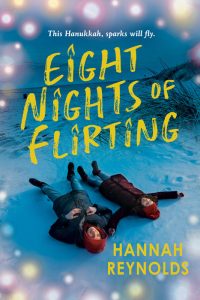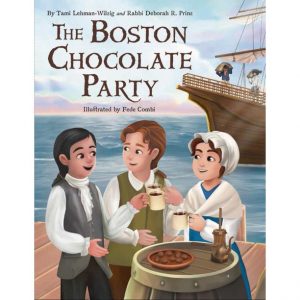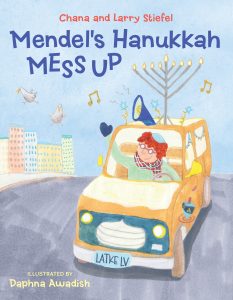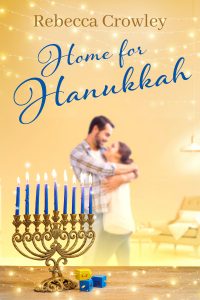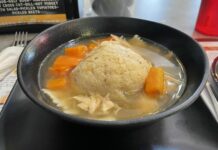Every November and December without fail, bookstores across the country dedicate shelf space for Chanukah books, many of them picture books aimed at young children. But this year’s crop feature titles for all ages with the requisite picture books for children, a young adult (YA) romance for teen readers and a Chanukah-set romance for adults, among many others.
While the “Festival of Lights” binds the stories together, each of the authors came at their tale from a different place. Authors Chana Stiefel, Tami Lehman-Wilzig, Hannah Reynolds and Rebecca Crowley opened up about the challenges and the joys of writing a Chanukah book, what makes their stories unique, and whether the book has appeal outside of the Jewish world.
What genre is your book? Can you tell us a little about it, and what role Chanukah plays in the story?
REBECCA CROWLEY: “Home for Hanukkah” is a contemporary romance and the fourth book in my Orchard Hill series, which focuses on Jewish holidays. In it, biotech entrepreneur Zach Strauss is back in his hometown of Orchard Hill, Miss. His latest venture has flopped, leaving him broke and desperate for work. Noa Jacob owns Second Chance, a thrift store-turned-gift boutique, and the last thing she needs is an employee since it’ll already take a miracle to keep the failing business afloat. But magical-thinking Zach is charming and handsome and full of ideas big enough to sweep even down-to-earth Noa off her feet.
This series started with Chanukah in the first book, “Shine a Light,” so it only felt right to end it there, too. Whereas that was about the symbolism of light in darkness and hope at bleak moments, the themes of “Home for Hanukkah” are miracles and the possibilities we carry in our hearts as well as our hands. The holiday brings Zach and Noa together literally, romantically and spiritually, especially as Noa grows into her faith and Zach reconnects with his.
CHANA STIEFEL: In “Mendel’s Hanukkah Mess Up,” which was co-written with my husband Larry Stiefel, Mendel is always messing up. So no one is more surprised than he when the rabbi asks him to drive the Mitzvah Mobile through the streets of New York and invite everyone to the big Chanukah bash. What could possibly go wrong? As Mendel begins to spread the joy of the holiday to his neighbors, he learns that mistakes can happen, and sometimes, the results can be miraculous.
HANNAH REYNOLDS: “Eight Nights of Flirting” is a young-adult romantic comedy. Sixteen-year-old Shira is desperate to win over her crush, who will be joining her family’s Chanukah celebrations on Nantucket. The only problem is that Shira has no idea how to flirt, so she strikes a deal with her playboy neighbor, Tyler, for lessons. Shira is convinced that the plan is perfect (after all, there’s no way she’ll fall for cocky, confident Tyler), but as they spend time together over hot cocoa, burning candles and snowball fights, their dynamic changes from enemies to friends to something more.
The book starts at Chanukah — Shira and Tyler are snowed in together on the first night of the holiday — and continues through the end of the year. Shira’s boisterous extended family comes together to celebrate, and they make candles, latkes and chocolate babka. Shira has a dozen cousins and three of them (the formidable triplets) rope the rest into performing a Chanukah play they have written, featuring both the Maccabees and biblical Judith. Those scenes were some of my favorite to write; I love family shenanigans and forcing characters to run lines in awkward scenes together.
TAMI LEHMAN-WILZIG: “The Boston Chocolate Party,” which I co-authored with Rabbi Deborah Prinz, is a story of freedom, friendship and a love of chocolate. It takes place during Chanukah in colonial Rhode Island and Boston. The story revolves around a boy named Joshua Mendes. He misses his best friend Isaac, who has moved to Boston because of economic reasons. Joshua’s Papa is importing chocolate beans to the American colonies, showing cafe owners how to make hot chocolate now that the British tea tax has made tea too expensive to drink.
Joshua realizes that the chocolate business could be the ticket to a better life for his friend’s family. When Papa travels to Boston, Joshua joins him. Together, they celebrate Chanukah with Isaac’s family and help them open a chocolate house while in the background, the people of Boston demonstrate against British tea taxation.
Why did you want to write a Chanukah story?
REYNOLDS: I’ve always loved romantic comedies, and this time of year there are tons of them, but almost all are about Christmas. I’ve enjoyed those movies and books, but felt like my own identity doesn’t exist in those worlds. In “Eight Nights of Flirting,” I wanted to create a story with the same sense of joy, love and optimism but centered on Jewish characters; I want Jews to feel included and seen in this cozy rom-com. A book at Chanukah gave me the ability to jump into the wintry fun I love — from sledding to roaring fireplaces — and also include many of my own family traditions — from the songs we sing to the food we make.
LEHMAN-WILZIG: In my research, I discovered that the Boston Tea Party took place on the last night of Chanukah. The connection was just too rich to pass up.
CROWLEY: Because I was sick of all the Christmas stories! Just kidding … sort of. I do get a little frustrated this time of year with the Christmas onslaught (just a few days ago, I spent an hour hearing nonstop Christmas songs in the grocery store), and Chanukah is the perfect antidote. It’s a bright, cheerful, fun holiday that lights up these dark, wintry nights.
STIEFEL: “Mendel’s Hanukkah Mess Up” is based on a short story that Larry wrote for his blog “The Maggid of Bergenfield.” One year, Larry challenged himself to write eight stories for eight nights. Mendel was my favorite story, and as a children’s book author, I saw the potential as a picture book. So we decided to rewrite it … and miraculously, thanks to our agent Miranda Paul, our editor at Kalaniot Lilian Rosenstrich as well as illustrator Daphna Awadish, it’s now a book!
Given the sheer number of Chanukah books on the market these days, did you have any concerns about your title standing out?
LEHMAN-WILZIG: I think that the book stands out because it is so different from the rest. After all, how many Chanukah books are set in Colonial America? As far as I know, there’s only one other — “Hanukkah at Valley Forge” — and it was first published in 2006.
CROWLEY: The romance genre is still pretty thin on Chanukah books, especially compared to Christmas. When it comes to Chanukah romances and getting our stories out there, my attitude is the more the merrier, so I want to shout out to some of the other great authors breaking that mold, including Stacey Agdern, Jennifer Gracen and Jean Meltzer.
STIEFEL: Just as each of us experiences the holidays in different ways — with different traditions, customs and memories — there are always new ways to share a holiday story. For this book, Larry’s creative imagination has touched the hearts of many people, including members of the Chabad-Lubavitch community, who often share the light of Chanukah by driving mitzvah mobiles (or “Mitzvah Tank” vans with menorahs attached to the roof) around town. The process of bringing this book to life has been joyful from brainstorming to bookshelf.
REYNOLDS: Unfortunately, as my book is young adult, I had no difficulty making it stand out; too few Chanukah romances for teenagers exist. Hopefully, one day we’ll have enough YA books that there will be lots of stories to choose from.
Is there a diverse market for Chanukah books outside of the Jewish community?
REYNOLDS: There definitely is! I’ve heard from lots of non-Jewish readers, and they have all been very sweet. Many of them have told me they didn’t know anything about Judaism or Chanukah before, and they liked learning and had lots of fun. I think it’s very important that non-Jewish readers read Jewish stories; reading is a great way to increase empathy, and I think we could all use more of that in the world.
LEHMAN-WILZIG: Because “The Boston Chocolate Party” takes place in Colonial America, it has a much broader appeal than the average Chanukah book.While I haven’t heard directly from any non-Jewish readers, I have noticed that the director of the Heartland Book Festival in Elizabethtown, Ky., has followed and liked many of my LinkedIn posts on the book, and even tagged people he knows about it. I have no idea where that will lead, but it certainly was an interesting development for me.
… [Also] during this period of rising antisemitism, many parents have written to me, thanking me for the book because during this difficult period, it helps them show their children that Jews lived in America from the very beginning and played a role in its development.
CROWLEY: Chanukah seems to be the best crossover holiday in terms of resonating with non-Jewish readers. The second and third books in the Orchard Hill series are about Passover and Rosh Hashanah/Yom Kippur, respectively, and anecdotally, they seemed to have a much lower uptake than the Chanukah stories that bookend them. I think people are in the mood for seasonal buying and reading this time of year, and perhaps more inclined to dip into something a little out of their comfort zone.
STIEFEL: Yes! Mendel is a relatable character in that he is constantly messing up. We all make mistakes, and sometimes, the results can be marvelous. Teachers, parents and librarians have shared the book with children of all backgrounds because it’s very important to learn about holidays that take place outside your culture. In fact, recently, a teacher at a public school in South Carolina tweeted: “This read-aloud is an EXCELLENT addition to our virtual class library. What a great resource to support our exploration of other cultures and traditions!”
Faygie Holt is a freelance writer.


